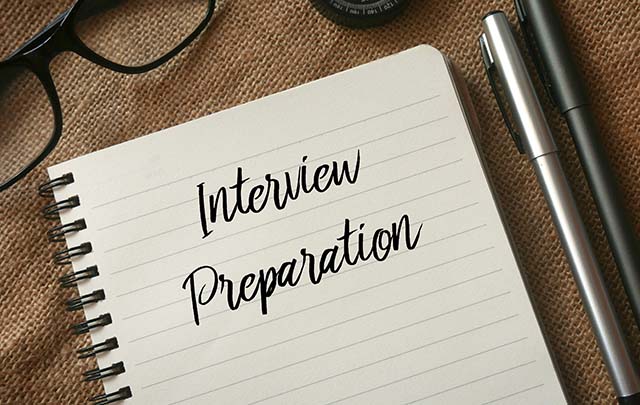Job interviews are potentially nerve-wracking experiences. You’re put on the spot, probed, and given a series of challenging questions. The interviewer may attempt to trip you up, and there are several traps that applicants fall into.
However, if you know what to expect and take a considered approach, you may be able to position yourself favourably and get ahead of the competition. You’ve invested the effort into creating an effective resume; now it’s time to concentrate on the next stage.
Here are 10 expert interview advice to help you get a job.
1. Investigate the company thoroughly
Job interview preparation: Doing your research on the company is the basis for a successful interview. An understanding of the organisation and what they’re searching for will not only help you anticipate the questions they’ll ask but will also allow you to answer in a more predictable manner.
What do you know about the company? A typical first job interview question, which you should be prepared for. It will be uncomfortable and make you appear amateurish or uninterested in the position if you don’t have a well-researched response.
It conveys the impression that you didn’t take the interview seriously in any case.
The interview isn’t a test to see if you can comprehend the company’s website. The majority of applicants will look at their website, but it is not a proving ground for whether or not you can read. Invest some time researching them online - read articles about them on the internet, watch YouTube videos produced by third parties, or watch videos of the company. Consider their social media profiles - what message are they attempting to convey? What do they have posted and tweeted on social media? Is there a way that your expertise might be connected to one of their current campaigns?
2. Prepare responses to job interview questions by predicting them and practising
Make a list of questions and answers for a job interview. Prepare to defend any gaps in your CV and the reasons behind your previous departures. Look at the job requirements and consider specific examples of how you can demonstrate these abilities.
A simple strategy to do so is to compare the required skills in the job description to your prior experience.
Aside from preparing your responses to all of the typical interview questions such as “Tell me about yourself” or “Why do you want to work here?” , make sure you have examples of how you’ve added value in the form of a STAR. What were your most significant achievements? Are they relevant to the position for which you’re applying? Do you have any stories of tough circumstances that you’ve overcome, dealing with conflict, working under pressure, or leading important projects? Make sure you spend a significant amount of time writing down notes and preparing your responses to all of the most typical questions that might be asked.
3. Dress appropriately
What to wear to a job interview? Plan an outfit that reflects the company’s culture and demonstrates your professionalism. It’s usually preferable to overdress rather than undress if you’re unsure. Having said that, if the firm’s dress code is extremely casual, you may appear either too stuffy or “too corporate” if you wear a suit. Check for any people on LinkedIn or Facebook to see what the dress code is, or ask your recruiter. It’s essential to look clean and elegant whatever you pick.
Don’t overdo it with jewellery and keep things to a bare minimum.
4. Arrive a little ahead of time
It’s critical to convey the impression that you’re on time and want to feel calm and in command. Arriving early will assist you in both of these goals. However, don’t arrive more than a few minutes ahead of schedule; coming 20 minutes before your appointment is scheduled to begin might put your interviewer under strain.
Don’t put off making a professional resume or obtaining a pen and notepad until the last minute. Do all of these things well ahead of time so you have plenty of time to get to your interview.
5. Make an excellent first impression
The key to this is being on time and well-dressed. A good first impression is essential. Be kind and polite to everyone you meet. Give a solid handshake when meeting the interviewer, keep your gaze focused, and remember to make eye contact.
Avoid smoking or eating shortly before the interview, and if necessary, bring chewing gum to freshen your breath. Demonstrate an enthusiastic, upbeat attitude during the interview.
6. Keep your cool, be confident, cheerful, and determined
Job interview technique: During the interview, you’ll want to focus on how you respond and what your answers seem like. It’s important to show that you’ve done your research and know what questions will be asked in order for them to trust you.
Interviews for jobs are demanding, but well-planned preparation will boost your self-assurance and aid you in coping with the tension.
You should provide concise and clear responses. Explain what you can do and how your skills and experience match the position and the company. Use the STAR format to explain your accomplishments (Situation, Task, Action, Result). However, don’t give long-winded answers; instead, offer examples of your successes.
Stay positive. Don’t bad-mouth your previous jobs or ex-colleagues. The interview is focused on you.
7. Don’t be modest, sell yourself
The candidate that gets the position is usually the one who performs best in an interview by demonstrating why they are the finest fit for the job and company.
To accomplish this, you must first recognize yourself. It’s not the right time to be modest when going for a job interview. Prepare several specific, tangible instances that demonstrate the effect you’ve had in your past/current role.
8. Make sure you ask a lot of intelligent questions
This is fantastic job interview advice. To demonstrate that you’ve done some research, are interested, and are a serious contender for the position, ask at least a few questions.
Even if the interviewer has provided clear explanations and there’s nothing more you want or need to know, ask questions.
The ideal approach is to make a list of interview questions ahead of time and add new ones throughout the encounter.
Here are a few questions to ask at the conclusion:
What are your expectations for your new employee’s performance in the first three to six months on the job? In this position, how will my success be measured? What is the typical procedure for obtaining an official performance review at your company? What is the most essential and serious issue that this new individual must confront? What is the company’s culture like?
9. Make a great final impression
The impression you make at the end of the day is likely to be remembered. Make sure it’s a good one. Thank everyone who has interviewed you so far before leaving. You could also express your enthusiasm for this position after meeting with them.
Job interviews might be stressful, so don’t come across as if you’re itching to get home. The interview is a fantastic chance to demonstrate your abilities and learn about the firm; make sure your remarks and body language reflect this.
10. Follow-up is essential
Thank them for their time as soon as possible after the interview. Try to finish it within 24 hours. Thank them for their time and re-emphasize your interest in the position.
If you follow all of this job interview advice, you will have avoided the most typical blunders and established yourself as a serious candidate for the position.
If you’re seeking employment right now. To enhance your chances of getting to the interview stage, create an online resume using an online resume maker.
Discover your next life sciences role with Leo Xander
Do you want to continue your career in the life science field? Leo Xander is now looking for contract and permanent employees to work in a variety of departments, including project controls, process & project engineering, validation & quality, and automation & IT.
Discover how you can use your talents to help the world’s leading biotech companies innovate. Find out what life science jobs are available where you live by exploring our career opportunities list.




